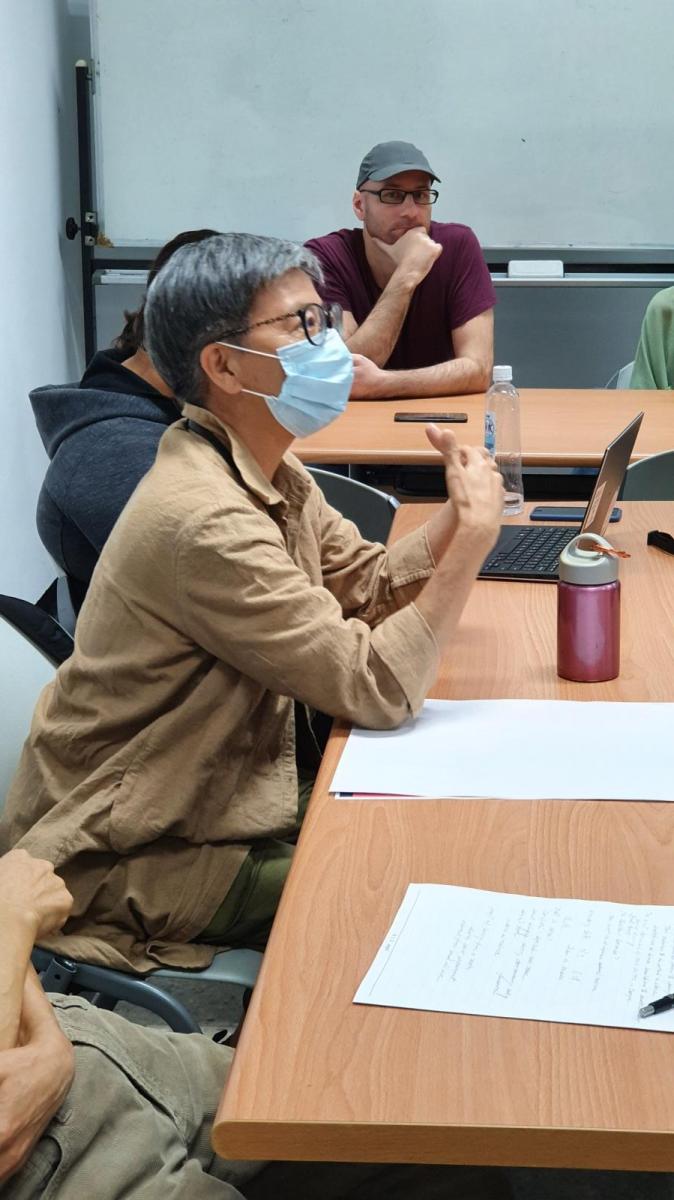

側記 : The Orientalist Gaz on Japanese Rope Bondage
2021-07-11

演講The Orientalist Gaz on Japanese Rope Bondage
講者Shin Nawakiri
活動紀錄-李宜靜
Shin Nawakiri started the talk with the history of bondage. He explains the concept of bondage is a recent invention, made by adult magazine producers, and usually shown in bars. Later the Japanese riggers gained fame in Japanese adult videos, and some became great rope masters as we know today. Japanese bondage had not known internationally until Hans Meijer introduced it in the article “Shibari: the House of Japanese Bondage” in the magazine Secret to the West in the year 2000. In the article Meijer not only introduced Japanese bondage but proudly showed some basic Japanese sentences like “Meet for the first time. How are you?” or “Thank you for accepting this humble gift.” Even though it appeared awkward but it added extra orientalist color to it.
In the imagination of the West, Asia has been good at “different” kind of torture. Even though many of the imagination is not true, it prevailed in the West. Take Chinese Water Torture as an example. That is merely an invention of an English novel imaging Asia. Also as we can see from many Western paintings, Western painters imagined a way of the Orient should be like. Among those paintings, the Orient was often pictured violent, lazy and mysterious. However, paintings did not present how Westerners were cruel to the Orient, and instead showing How Orientalist people hurt each other was a popular theme. Here Shin Nawakiri quoted Said “extraordinary degree to which the orient has become feminized by male writers in Europe.”
From paintings in 19th centuries to 20th centuries Hollywood movies, the representation of the Orient was either charming yet fragile women or women with deep affection. Oriental men on the other hand was depicted as either the asexual assistant of Westerners or feminine villain like Fu Manchu.
Shin Nawakiri then connected this Orientalism with what he read on Meijer’s articles, which celebrated Oriental torturing culture for its low level of physical demand. Meijer’s words conform with Orientalism. Using unnecessary details like Japanese language for subtitles to make it more authentic, or claiming only when people appreciate profound Japanese culture can they understand the mysterious technique of Japanese bondage. Shin Nawakiri argues, this Orientalist imagination exactly represents their own thoughts on sex, gender and women, but they attribute it to a culture far away, claiming it is their culture. Shin Nawakiri then concludes, the Western contempt to the Orient in 19th centuries now has changed to worship. Yet this is the two sides of a coin. It differentiates “we” and “they”, enabling the power the continue.
Then Shin Nawakiri turned to talk about self-orientalism. He explained at first people in
Japan didn’t pay much attention to Hans Meijer and the West didn’t have much contact with Japan’s BDSM. In 2020, London Festival of the Art of Japanese Bondage invited the first Japanese rigger and this opened up the opportunity for the world and Japanese riggers. One hand people outside of Japan realized it was not difficult to learn bondage in Japan, and the other hand Japanese riggers used this opportunity to travel around to gain fame. Shin Nawakiri coins 2010 as the beginning of the age of rope tourism.
When the Japanese bondage stepped into the world stage, the debate of Kinbaku and Shibari also was argued much in the West. People were asking which word Japanese people actually used. Some believed shibari was only created by Hans Meijer, and said Kinbaku is the more authentic word to refer to bondage. Shin Nawariki explains when this whole debate about Kinbaru or Shibari comes to the end it is about what is “true”. Telling the fake one from the real one is usually the first step of Orientalism, he says.
In the conclusion, Shin Nawakiri reminds that people from privileged culture projects its own insufficiency and desire to another unknown culture, distinguishing “we” and “they”, making up the mysterious tradition of others. After a while, this invented tradition would get more and more ‘real’.
近期新聞 Recent News


